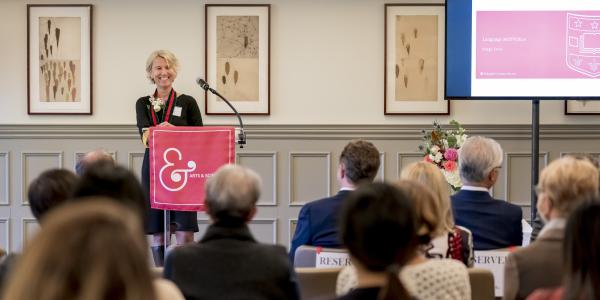Colleagues, family, and friends joined Margit Tavits, chair and professor of political science, at Washington University's Whittemore House Oct. 19 to celebrate Tavits' installation as the Dr. William Taussig Professor in Arts & Sciences. Chancellor Andrew D. Martin and Dean Feng Sheng Hu provided remarks at the ceremony, and fellow political scientist Andrew Reeves introduced Tavits. After being presented with a professorship medallion, Tavits discussed her research in a lecture titled "Language and Politics."
About Margit Tavits
Margit Tavits is professor of political science and chair of the Department of Political Science at Washington University in St. Louis. She specializes in comparative politics, with regional expertise in Europe. She is a well-recognized scholar of political parties, political institutions, corruption, post-communist politics, and gender equality. In addition, she has contributed to our understanding of the effects of wartime violence on post-war politics, inter-ethnic cooperation, and women’s representation. Some of her latest research ventures into an uncharted territory in political science: she explores how the language we speak affects how we think about politically relevant issues such as gender and LGBTQ equality, environmental policy, and ethnic divisions.
Tavits is the author of four books and close to 60 peer-reviewed articles, many in the most visible outlets of the discipline. Her work has been supported by the U.S. National Science Foundation, the German National Science Foundation, the Weidenbaum Center, the Center for the New Institutional Social Sciences, and other sources. Her first book, Presidents with Prime Ministers continues to be cited in policy debates on whether to implement direct presidential elections in parliamentary systems. Her second book, Post-Communist Democracies and Party Organization was foundational in drawing scholars’ and practitioners’ attention to organizational strength as a key to helping parties survive and stabilize in new democracies. Her third book, Clarity of Responsibility, Accountability, and Corruption (co-authored with Leslie Schwindt-Bayer from Rice University) documents the institutional configurations that make it easier for voters to hold corrupt officials accountable, and has been endorsed by leading experts on corruption and electoral politics. Her fourth book, Voicing Politics (co-authored with Efrén Pérez from UCLA) shows, for the first time, that the language we speak systematically affects how we see the political world.
Tavits has served as a field editor for the Journal of Politics — one of the leading journals of political science, and held various important service and leadership positions in her department and the discipline.
About William Taussig
The Dr. William Taussig Professorship was established as a result of the bequest of Mr. William S. Bedal. Mr. Bedal practiced law in St. Louis for many years and served as vice president of the Bar Association of St. Louis. He was active in civic affairs, serving as a member of the Missouri Historical Society Board of Directors and on the executive committee of the St. Louis Symphony. In making the bequest to Washington University, he wished to establish enduring recognition of his grand-uncle, Dr. William Taussig, also an eminent St. Louisan.
Dr. Taussig was born in Prague in 1826. He came to St. Louis in the mid-1840s and died here in 1913. He attended medical school at Washington University and received an honorary law degree from the university in 1905. He was elected mayor of Carondelet in 1852, and he became a judge on the St. Louis County Court. While serving on the county court bench, Taussig was also appointed by President Lincoln as examining surgeon for the First Military District, assessing the physical condition of men drafted into the Union Army. In 1865, he was appointed to the post of United States Internal Revenue collector, the second appointee to that office from St. Louis. Soon after the close of the war, he became first president of the Traders’ Bank. He was the first president of the St. Louis Terminal Railway Association, a member of the St. Louis Board of Education from 1899 through 1911, and president of thatboard in 1902–03.





